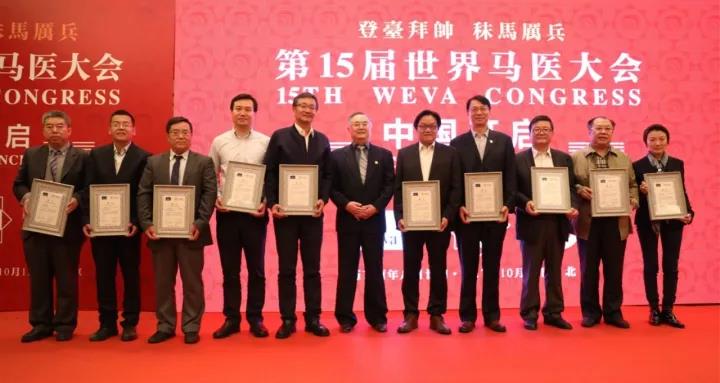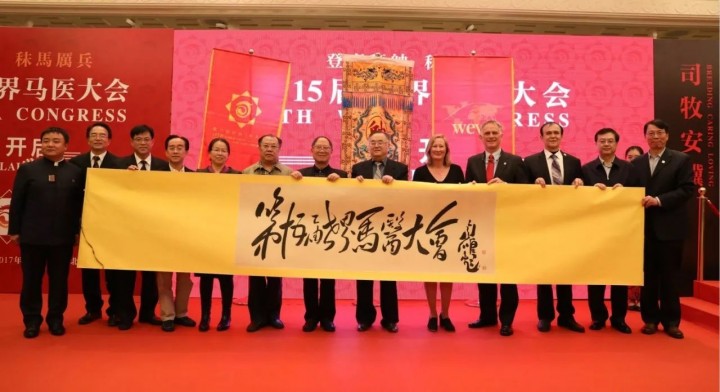Media Center
Dr. Chris Riggs’ speech at 15th WEVA Congress China Launch
Date:2017-10-18 Hit:798
Ladies and gentlemen, I have had the pleasure and honor to work as an equine veterinarian in Hong Kong for almost 15 years and to undertake many trips to several different regions of China over this period. I have been lucky enough to visit different universities and equestrian establishments throughout China and to meet many lovely people, including a wide range of committed and enthusiastic veterinarians. Over this period I have also witnessed a huge development in China’s equestrian sporting activities and its growth into a formidable presence on the world equestrian stage. Great sums of money are now spent annually importing top quality bloodstock into China, including Warmbloods from Europe, Polo ponies from South America and Thoroughbreds for Australasia. Chinese riders rub shoulders with the best in the world and there must be great hopes for wonderful achievements on the world stage for the future.

However, while China has made great strides in equestrian activities the nascent China horse industry has not made similar progress in its ability to care for the horses at the centre of these sports. A horse that suffers disease or injury in China has a significantly lower chance of recovering than one in other developed countries in the world. Despite amazing advances in so many areas of technology in China, veterinary care of the horse has lagged behind and it remains a long way behind what is possible in all of the major centres of equestrian activity. I know very well from personal experience that this is not because China lacks talented, dedicated individuals who have the desire to make the necessary improvements. Indeed, I have had the great pleasure of getting to know many Chinese vets whose commitment to caring for the horse is admirable and who I am proud to call colleagues. Rather, it appears to be due to a lack of appreciation by horse owners and investors in equestrian industries of what the veterinary profession could do for them. This has led to under-investment in the equine side of the veterinary profession, making it extremely difficult for individuals to develop personally or for them to acquire the facilities they require to practice effectively. Lack of specific equine training in the undergraduate veterinary curricula and absence of suitable opportunities to develop practical knowledge and skills makes it that much harder for veterinarians to graduate with the necessary skill-sets to provide the services that are required to make an impact. There is a negative cycle of the profession failing to provide what the client wants leading to lack of investment in the profession by the client, which perpetuates the situation. This state is exacerbated by a very limited supply of suitable drugs, which makes it impossible for veterinarians to undertake what is routinely accomplished elsewhere.
The World Equine Veterinary Association Congress next April will provide a unique opportunity for everyone involved in horse industries in China to meet with specialist equine veterinarians from around the world. We have invited speakers who are not only leaders in their various fields but are also committed to sharing their knowledge and past experiences for the good of the horse. This will be a golden opportunity to develop networks with people who strive to make advances and who are enthusiastic to help. It will be a chance to hear first-hand what the veterinary profession does to support and enhance equestrian sports and industries elsewhere and discuss how this might be implemented here in China. There will be practical teaching for vets to help them expand their knowledge and develop new skills and in depth seminars on topics which are critical to positive, sustainable development of equine industries where the care of the horse remains the central theme.

In addition to being a board member of the World Equine Veterinary Association I am an employee of the Hong Kong Jockey Club, where I have worked as Head of the Department of Veterinary Clinical Services for almost 15 years. The HKJC is a remarkable organization that strives for and achieves many great things. Indeed, it has risen to be a world leader (many would say, “The leader”) in Thoroughbred horse racing. A fundamental reason for the Club’s success is its commitment to integrity and to caring for the horse. The Club has developed a highly motivated and qualified veterinary team and constantly invests in technology that allows that team to practice equine medicine as effectively as possible. In addition, the Club has clearly defined rules and regulations that are designed to protect the welfare of the horse which are stringently enforced. These principles help form the foundations that ensure that our sport remains top quality and retains the confidence of our customers. I am lucky to serve under a CEO, Mr. Winfried Engelbrecht Bresges, who is committed to horse welfare. Like the rest of us, he is well aware that there is always room for improvement and he sees the value in investing in measures that pave the way for positive evolution of our sport. I am delighted to announce that Winfried will be speaking at our Congress, heading up an in-depth seminar on Thoroughbred racing, which will cover a wide range of topics, all of which have the horse and its welfare at their centre. As Chairman of the Asian Racing Federation Winfried sees the importance and value of sharing the knowledge and skills that the Club has built through years of investment, in the hope of accelerating positive development in equestrian sports throughout Asia and in China in particular. You may be aware of the exciting project that the HKJC is undertaking at Conghua, Guangzhou. We are nearing completion of construction of what will be one of the biggest, dedicated racehorse training facilities in the world. The centre, which will open in July next year, will set the benchmark globally for best standards of care and management of the Thoroughbred racehorse. We are optimistic that it will flourish, thereby providing healthy employment for a large number of people and enriching the lives of many. In line with the training facilities, we have built an equine hospital that will be state-of-the art when fully equipped. When we open next year I am delighted that we will have one graduate of the Veterinary School from Inner Mongolia Agricultural University in our team at Conghua. Dr Shan Ran undertook an 18 month HKJC Scholarship at the Royal Veterinary College, University of London after which he successfully sat and passed the examination to achieve membership of the professional body that oversees our profession in the UK. The additional training that he undertook in this process has allowed Ran to develop knowledge and skills that are more suited for our stringent requirements at the HKJC. I am excited that our Hospital at Conghua will offer a facility where we can undertake further training of colleagues in China and inspire other investors to support young vets in a similar fashion. I sincerely hope that in a few years the entire team in our hospital at Conghua will be comprised of Mainland vets, who will provide a service second to none.
It is evident to us all that China has the potential to achieve great things in the modern horse world. It has already made great leaps in that direction and looks set to continue. However, the China horse industry can only achieve its full potential when it has also developed the infrastructure to adequately care for the animal which is at the centre of this sector: the horse itself. Horse welfare must come first and foremost if equestrian sports in China are to flourish and take a central place on the world stage. Investments must be made in the training and ongoing development of young veterinarians for the future. Suitable facilities must be built and access to the necessary resources, including medicines, established. Developing these fields will provide long-lasting benefits and will generate rewards that are meaningful to society and China’s image globally as well as greater financial return to the equestrian industry in general.
China has the people to achieve what is required and I sincerely hope that the WEVA congress next year will be one catalyst that helps this accelerate this process forwards.

PrevProf.Jia Youling’s speech at 15th WEVA Congress China Launch2017-10-18
NextAbout the WEVA Congress2017-07-25
